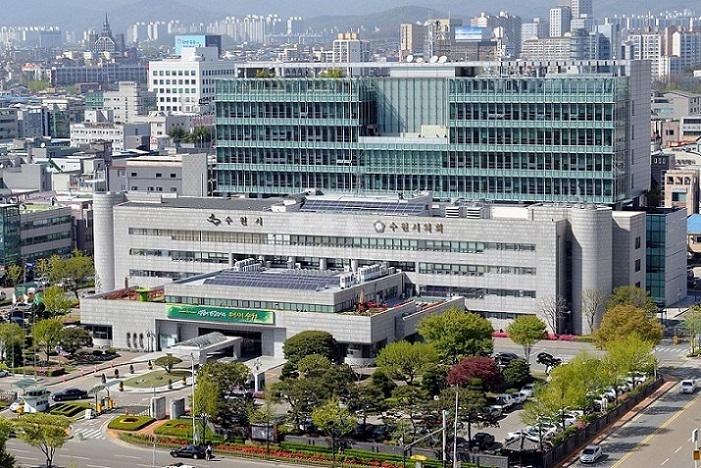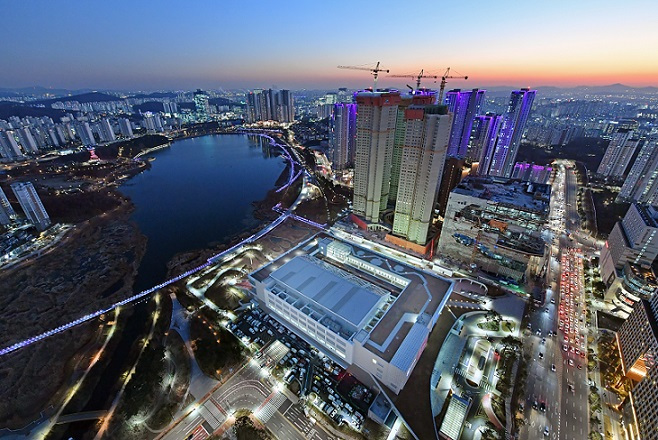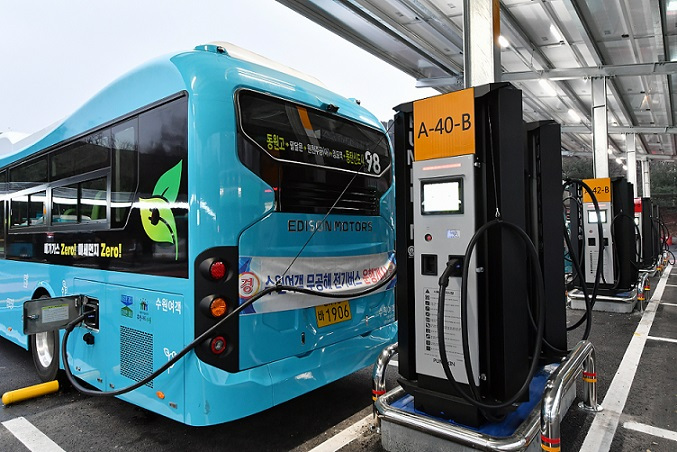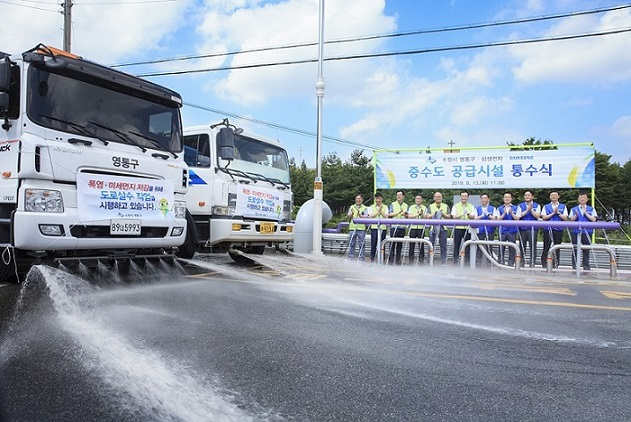 |
Suwon City Government building (Suwon City) |
Under a 10-year drive to create a human-friendly and innovative environment in Suwon, Gyeonggi Province, the city with a population of 1.25 million has become a global green city.
In its final year that wraps up the grand policy drive, Suwon Mayor Yeom Tae-yong has vowed to focus on creating jobs and enhancing the welfare system, while seeking new growth engines for the city’s fiscal independence.
“To boost employment, the city government has decided to create 34,000 jobs in both the public and private sector through job-making projects,” Yeom told The Korea Herald. “Among them is a so-called new job project targeting young adults and middle-aged women seeking jobs after career breaks.”
The employment rate in Suwon came to nearly 60 percent in the second half of 2019, down 0.6 percent on-year, according to Statistics Korea.
Under Yeom’s leadership this year, 28 divisions of the city government will take part in creating jobs by providing supporting programs for migrant women or a startup business at the city hall and district offices.
In December 2019, the city has also embarked on a job-creation project for the elderly. So far, 4,660 job openings were made in public and private services at facilities including libraries and community centers.
“As for employment in the private sector, the city will strengthen its efforts to increase productivity of startups and small businesses. The Suwon Business Incubation Center will expand marketing training programs offered to startup founders,” he said.
“In addition, to revitalize local businesses, the city will issue additional local currencies -- including Suwon Pay worth nearly 40 billion won that can be only used within the city.”
The fast-aging society has become a major hurdle for the city. As of January, senior inhabitants account for 10 percent of the population, according to data.
In response to the increasing demand for social services due to rapidly aging population, Suwon will improve social welfare services for the elderly. the mayor said.
The city will establish a new, city-funded welfare foundation this year to manage welfare and social programs. It also plans to conduct regular surveys on one-person households with middle-aged or old residents to understand their welfare needs and prevent them from dying alone.
Care services for old people are in progress as well. In November, Suwon contracted out senior care services to 10 community centers in the city and now inhabitants living alone or with their spouse only are subject to domiciliary care provided by the centers’ year-round service programs.
Budget constraint is also a problem. According to the city’s proposed budget for 2020, the local income tax is forecast to reach about 890 billion won ($748 million), down 75 billion won from the previous year. Such a reduction came after a recent slump of semiconductor market, the city’s main industrial sector.
Despite deficit financing, about 44 percent of this year’s budget, or 141 billion won, was allocated for welfare schemes, up 77 billion won from a year earlier. Instead of allocating less for social welfare policies, the city government has decided to take measures for efficient budget spending.
The preliminary screening of city-funded projects will be strengthened through the year to reduce wasted budget. Also, to properly respond to possible tax revenue shortfalls, the city’s special fund depositing extra tax revenues was implemented on Jan. 1.
Future growth
Under the Human City drive that was initiated in 2010, Suwon has grown into a regional hub for meetings, incentives, conferencing and exhibitions (MICS).
 |
Suwon Convention Center, a hub for MICE industry (Suwon City) |
The Suwon Convention Center that opened last year in Gwanggyo as part of the government’s development project is one of its triumph.
Since last year, the city has fostered the MICE industry as a future growth engine by developing the area around the center into a complex by building a hotel and department store close by. The complex is expected to produce fresh income worth nearly 600 billion won.
In December, the city’s dream of becoming a mecca for MICE business began. Its convention center was selected as a venue for the fourth session of UN Environment’s Forum of Ministers & Environment Authorities of Asia Pacific held from Sept. 8-11 this year.
Under a long-term goal of “environmentally sustainable city,“ Suwon has been firmly committed to environment-related projects.
 |
Suwon has 96 charging stations for electric buses. (Suwon City) |
With the objective of operating 1,000 electric buses by 2022, the metropolis completed the construction of 96 charging stations for carbon-free public transportation late last year. This year, in partnership with a bus operator Suwon Citybus, the government will encourage the operation of electric buses in the city.
In addition, Yeongtong-gu, a district located east of Suwon signed a memorandum of understanding with Samsung Electronics’ Global EHS center last year to establish a water reclamation facility. Opened in Aug. 2019, the facility’s free water supply has eased the district’s job of sprinkling water on the street, washing away fine dust and cooling heated roads amid extreme heat waves.
 |
Water reuse system jointly launched by Suwon and Samsung Electronics. (Suwon City) |
“This year is momentous for the city’s environmental sustainability,” the mayor said. “We will expand our environmental policies to be identified by global citizens as one of the three international eco-friendly cities alongside Frankfurt, Germany, and Curitiba, Brazil.”
The mayor, who was elected in 2010, has led the Human City project aimed at pursuing a balance between economic growth and social well-being. This year’s slogan for the project is “People First Suwon, For Greater Suwon.”
By Park Joung-kyu (
fob140@heraldcorp.com) & Choi Jae-hee(
cjh@heraldcorp.com)











![[Today’s K-pop] Blackpink’s Jennie, Lisa invited to Coachella as solo acts](http://res.heraldm.com/phpwas/restmb_idxmake.php?idx=644&simg=/content/image/2024/11/21/20241121050099_0.jpg)